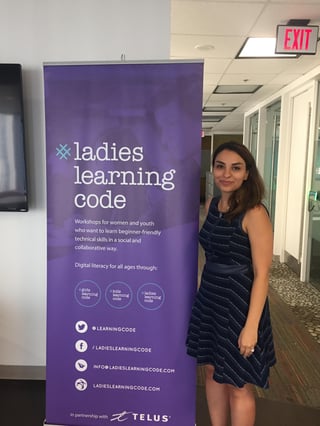We attended the National Learn to Code Day in Toronto this year, and in addition to helping out with the event, we had a chance to talk with three participants and an instructor about what it’s like getting started in data science.

Hi Lauren, Jane, and Trisha! Could you tell us about your background and level of experience in data science?
Lauren: I’m a front-end developer, and my main interest resides in the user experience. I took one course on artificial intelligence at the university, and I’m excited to see how it will continue to play into my role. So far, it’s mostly been about how we understand the data from our CRM so we can make better decisions, but it evolves a lot!
Jane: I’m in charge of sales and operations at a fintech startup here in Toronto. I have no previous tech experience, so data always felt very intimidating and overwhelming to me. But I’m interested in learning how data effects the operations that sales people do in order to improve the pitch and how to face customers. It’s mostly about how we can analyze the data we have and turn it into a strategy.
Trisha: I’m a marketing major, and I was mostly curious to hear about what data will bring us in the future. I had just read about big data and had not really had any hands-on experience with it until today!

What are your main takeaways from National Learn to Code Day?
Lauren: Throughout our jobs, we must now understand how data analytics can help us solve our day-to-day problems. My main takeaway from this event is to think about how to become entirely data driven, even in the smallest operations.
Jane: I think the whole big data thing just scares everyone when they hear it, but I’ve learned that it is mostly because they don’t know what it means — otherwise, it’s workable! I also feel like I can now have an intelligent conversation about the hot topics that are artificial intelligence, machine learning, and deep learning.
Trisha: When we worked on a dataset from IBM to determine the likelihood of people leaving the company, I grasped the inherent human bias that applies to working on data. It’s important to be aware of this and that the whole field becomes more inclusive, thanks to initiatives like Ladies Learning Code.

What are your first impressions using Dataiku?
Jane: To me, it’s similar to an Adobe software: at first it’s just a lot of functions but when you understand the tool, you can really take advantage of it. I love the visualization aspect and how simple it was to create meaningful charts and dashboards.
Lauren: It’s easier to start with a business problem, like we did today with IBM wanting to solve its attrition rate. It helps framing the issue and finding paths towards solutions.
Trisha: It’s a lot of trial and error on my part, as I was exploring what kind of information was out there on Kaggle. Having no programming background at all can be pretty intimidating but it was actually much easier than what I thought thanks to the many drag-and-drop features. I’d like to play more with it at home, so I’ll start brainstorming the projects I’d like to work on and then play with the data.
An Instructor’s Perspective: Parinaz Sobhani, Machine Learning Director at Georgian Partners

Hi Parinaz! Could you tell us a bit about your background?
My background is in machine learning, and I do a lot of data science projects at an investment company called Georgian Partners. I’m part of the Impact Team, which is responsible for post-investment engagement with startups; we’ll help them manage data and analytics and usually give advice to the R&D teams to grow faster based on our findings.
Why did you choose to volunteer as an instructor at Ladies Learning Code?
I have a lot of passion to enable more women to get into data science, as it is still a male-dominated environment. I think events like today’s Learn to Code Day are mostly intended to give confidence to women. My main message is: even if you don’t know programming, you can manage real data science projects using software like Dataiku. You will learn along the way and get help from more experienced people on the most technical parts.
What were your first impressions using Dataiku?
Around the same time, I had to create the content of the artificial intelligence and machine learning course for Girls Learning Code. The challenge is, participants have very different backgrounds and level of experience in programming, and of course you don’t want to leave anyone behind. Dataiku has the nice user interface, so we thought: why not use it?
The technical setup was demanding to enable 1,500+ participants to use it at the same time, but we managed to continue the class when it was slowing down and participants have had a fun time playing around with it.




